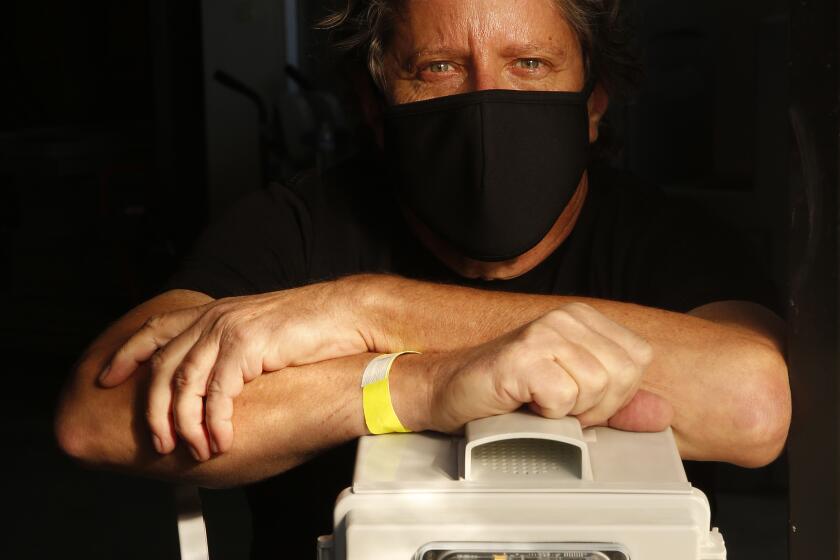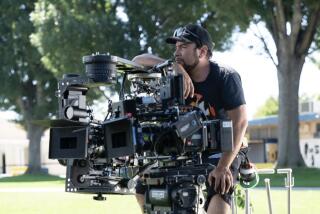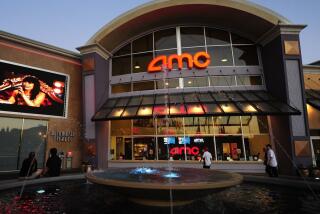Tom Cruise rant over COVID-19 safety is latest challenge to U.K.’s filming restart
- Share via
London — Perhaps the pressure was too great.
Tom Cruise, the 58-year-old movie star, earlier this month was recorded delivering an expletive-laden tirade on the U.K. set of his latest “Mission: Impossible,” threatening to fire crew members for supposedly flouting social distancing guidelines.
The shoot for the seventh installment of the Paramount Pictures franchise was among the first to shut down in March, and it faced more delays after outbreaks among the crew. Cruise’s outburst drew both support from those tired of antimaskers and condemnation from local union representatives who saw it as bullying. Some, like George Clooney, were torn, seeing a legitimate issue that could have been handled differently.
As the shutdown drags on, several countries have raised their flags, vying for production, touting their incentives, facilities and locations but also their low COVID-19 numbers, testing capabilities and safety measures.
The incident underscores how the U.K. is grappling with a rapid rise in COVID-19 cases while keeping its critically important film industry afloat. The U.K., with popular soundstages like Leavesden north of London, where “Mission: Impossible” is filmed, has allowed Hollywood studios to restart major productions. Now the region is dealing with a new, more infectious strain of the virus that has prompted numerous neighboring countries to shut their borders to it.
“This will present a fresh challenge for productions in studios and on location,” said Spencer MacDonald, secretary for Bectu National, a trade union that represents 40,000 crew members and others in U.K. film and television.
Notwithstanding the “Mission: Impossible” flare-up, MacDonald said his union has seen high levels of compliance with COVID-19 safety. Crew members, many of whom are freelance workers, are incentivized to be careful because they typically don’t get paid if production stops, he noted.
“People have been through such a painful period that they want to make sure that they don’t put themselves or anyone else into a situation that is going to jeopardize the production, so I think people have been really quite sensible about things,” he added.
Buckinghamshire, England-based Matt Spooner, production safety supervisor for “Mission: Impossible 7,” agrees.
“Productions have self-policed incredibly effectively,” Spooner said. “The unfortunate story that ran about the conversation that was had on set at the beginning of the last week really was largely in my opinion irrelevant. The compliance has been spectacular and crews have committed to it.”
MacDonald said there have been situations where crew should have been in so-called bubbles but instead were mixing or leaving location hotels where they were meant to be indoors. However, he said there have been few such incidents.
Thanks to generous incentives — an unlimited cash rebate of up to 25% on qualified expenditures, including actors’ salaries — Britain has emerged in the last decade as a major hub for shooting large feature films and TV shows. Productions can claim up to 80% of their budget.
Major players including Walt Disney, Netflix and Warner Bros. have made substantial investments in the U.K. in recent years. Last year, Disney signed a long-term lease at Pinewood Studios, while Netflix locked up 14 soundstages at Shepperton Studios. Warner Bros. has its own studios at Leavesden.
Following the success of “The Crown” and other shows, Netflix plans to increase its U.K. production budget to $1 billion next year, covering more than 50 shows.
The U.K. has enjoyed six years of near record-high film production activity, helped by an extension of its tax relief program in 2014.
In 2019, the value of high-end TV productions, including the Netflix period drama “Bridgerton,” reached £1.294 billion ($1.75 billion), up 51% from the previous year, according to the British Film Commission. Film production rose 17% from the previous year to £1.742 billion ($2.35 billion), thanks to Universal’s war epic “1917” and Disney’s “Black Widow.”
In March, the wave of activity came to a grinding halt due to the pandemic. Some smaller-crewed commercials continued filming but large shoots took until July to restart, MacDonald said.
Still, the industry has been able to continue working through subsequent lockdowns.
About 85% of the 280 productions that stopped in March are back in action, according to the British Film Commission.
U.K.-based projects include Steve McQueen’s “Small Axe” series for Amazon, which has already garnered awards recognition. The second seasons of Hulu’s “The Great” and HBO’s “Avenue 5” also have recently been shooting in London, according to Film London.
“Mission: Impossible” will return to filming in the new year.
Britain, along with New Zealand, Canada and Iceland, has remained an attractive destination because its infection rates have been much lower than other countries. In Los Angeles, where infection rates are higher, production remains far below prepandemic levels.
The British government also has shown a willingness to accommodate the needs of the industry.
For example, Cruise was able to convince U.K. ministers to let the “Mission: Impossible” crew skip a 14-day quarantine so they could restart filming this summer.
To be sure, there have been some challenges.
“Mission: Impossible” faced a second hiatus in October after crew members tested positive for COVID-19 while on location in Italy. Filming has paused for the holidays.
Warner Bros.’ restart of “The Batman” in the U.K., which had been on hold since March, had to be halted after its first week when star Robert Pattinson tested positive in September. Filming resumed a few weeks later and is set to continue until February, the studio confirmed.
Universal Pictures’ “Jurassic Park: Dominion” also had British crew test positive while on location in Malta, although production was not halted. The cast of the dinosaur movie has been in quarantine throughout the duration of the shoot, confined to a hotel near the set that was booked by the studio for 20 weeks, said a source close to the production who was not authorized to comment.
Netflix drama “The Witcher,” filmed near London, was forced to pause production in November when COVID-19 positive tests were discovered. Filming has since resumed, Netflix spokesman Jonathan Bing said.
In response to the pandemic, the British Film Commission and other industry groups created a set of protocols for COVID-19 safety on sets.
On June 1, they released guidelines that included input from U.S. organizations and were designed to be adapted by productions of different budget sizes.
These guidelines helped the sector restart swiftly, said the commission’s Adrian Wootton.
“We believe this to be the most comprehensive, extensively consulted-on COVID-19 recovery production guidance in the world,” Wootton, chief executive of the British Film Commission and Film London, said in a statement. “It is vital that productions follow the guidance and their own COVID-19 protocols.”
There are key differences between these guidelines and the protocols agreed to by Hollywood unions and an alliance of major producers. For example, the British guidelines do not require testing for COVID-19 on sets; only surveying for symptoms is recommended.
Sets must have COVID health and safety supervisors but, unlike in the U.S., they can perform dual roles.
In practice, however, British industry specialists say big-budget film and television productions like “Mission: Impossible” follow protocols established by American unions.
And Hollywood’s major studios have agreed to apply the same safety protocols worldwide, said Duncan Crabtree-Ireland, SAG-AFTRA’s general counsel and chief operating officer. The union is seeing consistent levels of safety on SAG-AFTRA sets regardless of the country of production, he added.
British union officials agree with that assessment.
“There will of course be COVID incidences, as there is within any industry. However, in general, we believe the protocols and the union’s collectively bargained agreements provide the basis for our members to work safely,” said Louise McMullan, deputy for Equity’s General Secretary, whose 47,000 union members include British performers, directors and stage managers.
The U.K., however, faces new challenges.
This week officials caused alarm after saying they discovered a new, more infectious strain of COVID-19, leading many countries to close their borders to travel from the U.K.
Because of the COVID-19 pandemic, new technologies are being developed to meet the needs of producers having to navigate stringent safety protocols for filming.
The British Film Commission said filming can continue during this heightened lockdown, allowing filming on the premises of businesses that are closed to the general public.
“It’s the unspoken challenge that will face us, it’s the fear of the unknown now,” Spooner said. However, he said he didn’t expect any changes to infection control measures in response to a new strain.
The U.K. screen industry also faces the challenge of Brexit and its removal from the European Union, but demand to film in the country has not abated.
“The next three months ... there’s an extraordinary number of shows starting out right across the spectrum,” said Spooner, the production safety supervisor.
More to Read
Inside the business of entertainment
The Wide Shot brings you news, analysis and insights on everything from streaming wars to production — and what it all means for the future.
You may occasionally receive promotional content from the Los Angeles Times.












